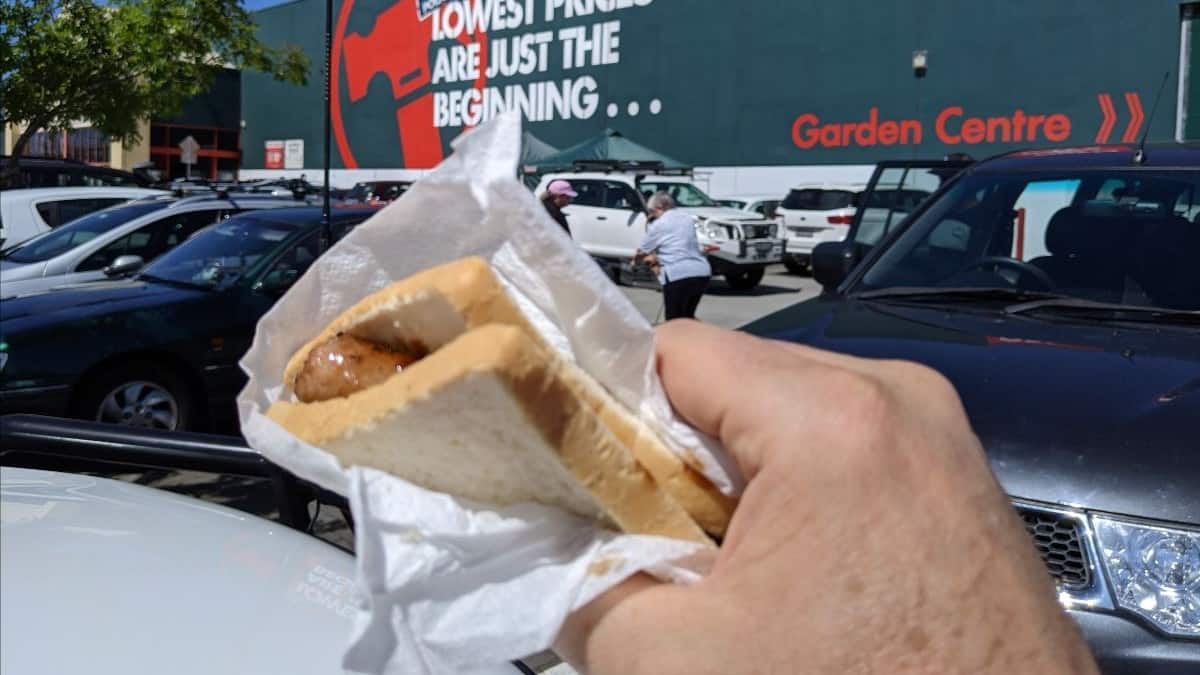How was my weekend?
Great, thanks for asking.
But it's a cautious reply.
See, I got to enjoy the relative freedom of being in regional NSW.
I know our Victorian brethren are still under lockdown, though, and I have no desire to rub salt into those very raw wounds.
After some thought, I posted a social media image of my first Bunnings sausage sandwich in more than 6 months, on Saturday.
As expected, it drew some comments from those south of the border about their inability to enjoy the same.
Not rude, not complaining. Just a gentle reminder that not all of our fellow Australians are in the same boat just yet.
For those people, it's cold comfort, but with any luck it gives a glimmer of hope. A reminder of what's on the other side of lockdown.
Also, because we're Australian, I got more comments on my onion options, at least a couple of comments on whether the onion was under or on top of the snag, and one mention that, obviously, my sauce choice should be tomato!
(For the record — and don't judge me — I'm strictly a 'no onion' kinda guy, and my selection of tomato sauce was either mis-heard or misapplied by the lovely lady at the condiment station, and I ended up with BBQ. Still, I'm not complaining…)
That was Saturday.
At around the same time, I read a Direct Message sent to me on Twitter, from Craig. He listens to our Motley Fool Money podcast (you do listen, don't you? If not, subscribe now!)
We'll answer his question this week, but in part, he said:
"I know I am old but lately when thinking about investing I have been thinking about the concept of "intense customer love"."
Now, that's music to my ears.
Because which company has a greater reliability of sales and earnings — and greater pricing power (even if it's unused) — than a company with intense customer love.
Now, let's think again about Bunnings.
My social media posts (on Twitter, Facebook and Instagram) got a stronger response than almost anything I've posted in years.
Bunnings snags are just one of those things.
Who doesn't love them?
Who doesn't have a positive mental response to the idea?
And to Bunnings in general?
Yes, Bunnings earned all of that through a superior business model, but our reaction to it, at a subconscious, emotional level is rarely about price these days.
Yes, 'lower prices are just the beginning', and yes, rationally, we say we know that.
But if we're honest, Bunnings is now the default option for those of us who live within cooee of one of those big, green boxes.
Asked to justify it, we'd talk about range, price and convenience.
But that's almost certainly our brains trying to rationalise our emotions.
Those of us who frequent Bunnings (you're welcome, shareholders), enjoy the experience of wandering the aisles. Of finding new stuff. And, yes, grabbing the sneaky sausage sambo on the way out.
We tell ourselves — and our partners — that it's range, and price. And probably convenience.
But it's not.
It's the same with any company that inspires that sort of 'intense customer love' Craig mentioned.
Think about Apple Inc. (NASDAQ: AAPL) products. Are they demonstrably worth x-hundred dollars more than the competition? Of course not. The processor might be a little faster. The screen a little brighter. The airpods might be slightly better quality.
But can you really justify that in dollar terms?
Of course not — with a single exception: we just 'like' it that much more. For inexplicable, emotional reasons. We like having the best. The design just makes us feel good. We like that it 'just works'.
The same is true of BMWs. Or Teslas. Yes, they do some things better. Maybe they accelerate more quickly (but is getting to 100 km/h a couple of seconds quicker really worth $40,000?), or the doors close with a thumpier whomp.
But do you get from A to B more quickly? More safely? Yes, it might be in more comfort, but what is that truly worth?
Less than what you pay for it, that's for sure.
But, to be clear, I'm not saying you shouldn't pay it. Or that you can't be happy with the trade-off.
I'm just reminding you that the difference is that squishy stuff of emotions, not hard logic.
It's not bad. It's not unreasonable. It's not wrong.
It's, well, love.
And that's okay.
And, as investors, it's more than okay.
I have to say, my biggest recent SNAFU, investing-wise, was failing to buy Apple back when the shares were about 60% less than today's price.
As a consumer, I'm not an Apple fan.
I'm Team Google.
But even Blind Freddy could see that the lines around the block, the sheer online mania, and the amazingly high prices Apple charges — and people willingly pay — tell you something about how much people love this company.
Was it my personal consumer electronics preferences that stopped me buying? Probably. Or I just stuffed up.
As for Bunnings? Have you ever looked at a Wesfarmers Ltd (ASX: WES) investor presentation?
Bunnings numbers are truly out of this world.
Numerically, I think it's fair to say Bunnings is the best retailer in the world.
If that seems like a big call, it is. But it's not hyperbole.
In the most recently completed financial year, Bunnings' earnings were up 14%. It was the best performing unit in parent Wesfarmers' portfolio.
It's return on capital was an astonishing 61%.
That is, for every $1 of assets in the business, Bunnings earned 61c.
Just. Last. Year. Alone.
The year before, it was 51c.
(To be fair — and to Wesfarmers' credit, the company was clear to disclose this — the 2020 ROI was favourably impacted by lower working capital at year end, this year.)
People love Bunnings. And the results speak for themselves.
It's one of the reasons Wesfarmers is in my Motley Fool Everlasting Income portfolio.
It's also a trait shared by customers of companies like Kogan.com Ltd (ASX: KGN) and 4WD specialist, ARB Corporation Limited (ASX: ARB).
They have passionate customers.
Their customers spend up big.
And keep coming back.
(Full disclosure: I own Kogan shares — and a couple of the company's TVs — and my Hilux is getting driving lights installed by my local ARB as I write this, so I have some first-hand knowledge.)
Craig is dead right.
Love matters.
Because love makes us (generally) loyal. It makes us irrational. It entices us to do things that otherwise aren't rational. And yes, it makes us feel good.
A company with those sorts of customers is pretty likely to do well, wouldn't you think?
Love isn't enough, of course. You need a business model that works. You need growth opportunities. And you need to be able to execute on them.
But man, if you can get all of that stuff in one place, it's pretty likely you have a good investment candidate.
That combination is why — Buy recommendation alert — both Kogan and ARB are Buy recommendations at one of the other investment services I run, Motley Fool Share Advisor.
At the time of writing, our ARB recommendation is up 125% since we recommended it in mid-2017.
Kogan is currently showing gains of 231% and 511% on our two Buy recommendations.
(Yes, we make mistakes, too. And past performance is no guarantee. But it's a good illustration, no?)
It's not the only way to invest, of course. Or foolproof.
But if you can find a company that has loving customers, you're off to a pretty good start.
So, here's to the Saturday sausage sizzle at Bunnings.
Long may it continue, and I hope our Victorian readers aren't far away from their next one.
Fool on!









